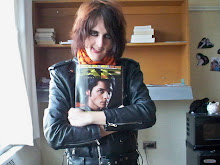I was thoroughly enjoying the film whilst watching it in class, that is however, right up until the end of the film and its final number of 'The Forgotten Man'. Now I am not denying for a minute that it is a spectacular final number with an important message conveyed through it, however, my argument here is focusing on how I feel the end to the film was inappropriate and greatly effected my overall enjoyment of the film.
Whilst the final song serves the purpose that this classical era of musicals required to end the film/show with it's biggest and most spectacular number, I felt that in this instance it was a bad way to end the film. Admittedly, within the context of the film being set in the depression and the musical itself revolving around the same theame, "The Forgotten Man" serves as an effective reminded of the harsh reality that the real people in the film and its audience find themselves, brutally depicting the tragic fall of the soldier returning from way, scared and bruised and facing the darkly tragic long depression-era lines for bread and soup after being promised bonuses for being veterans. With this attitude in mind, 'The Forgotten Man' also serves to be an effective juxtaposition to the film's opening number of 'We're in the Money' which can be interpreted and mirroring society's downfall from rich and prosperous to towntrodden and desperate.
My argument behind 'The Forgotten Man' is supported by the fact that it has nothing to do with the ending of the narrative plot. I am aware that with this classical musicals, most of the big numbers had few (if any at all) tenuous links to the actual plot itself, but "The Forgotten Man" feels so far out of place that it completely jarred with my enjoyment an d the progression of the narrative plot itself. In studying the final actions of the characters themselves, it is clear that all three girls are/will be happily married to rich and successful men. They have been recieving lavish present after lavish present including dresses, hats, furs and even a dog and have been attending dances whist still trying to take the hapless bankers for the proverbial "ride". This coupled with the men themselves being incredibly rich and well off, suggest that they themselves have nothing to worry about in this dark time, they'll get their happy ever after with their love and their money, therefore after this happy ending, "The Forgotten Man" seems to be a completely innappropriate ending to the film and lacks the emotional gravitas and effect it is meant to have on the audience.
It was interesting to learn that "Pettin' in the Park" was originally intended to the final number, whilst I would uphold other people's objections that this might have been an overly shmaltsy way to end the film, I agrue that it would have suited the notion of the "happy ending" far better. I personally would have ended the film with "The Shadow Waltz" as to my mind it was by far the most impressive musically and visually with the neon violins. In addition to this "The Shadow Waltz" could have better represented the final calm that the characters felt that now they were set for life and the worry being finally over for Lawrence no longer cutting off Brad's allowance and his newfound love for Carol (incidentally, the forgiveness end scene also felt far too rushed and implausable, Lawrence quite litterally goes from being full of anger towards his brother one minute to completely forgiving him the next).
A brilliant point was also raised in class that it seems almost insulting that a billionaire should be writing the almost funeral-durge that encapsulates the feelings of the down-todden men suffering in the depression when he himself has no such worries or cares and is certainly not writing from experience. The ladies too have now become so far removed from their past life of being poor and sharing the same clothes that their singing of "The Forgotten Man" can also be seen to be highly hypocritical. With this in mind, arguably the final number should have been 'We're In the Money', the women have achieved their aim of no longer being poor and having rich and successful men to spoil them with whatever they ask for and the men now have wives and all the money they need to protect them from falling to the same level of the fallen men who the musical is supposed to elevate to strong survivors.
In summary, 'The Forgotten Man' falls flat as a final number due to the fact that the idea that the film is set during the depression is almost unbelieveable as throughout the film we have seen nothing but fantasticly extravagant sets, fancy dances and a seemingly endless procession of displays of wealth from framed cheques and lavish clothing, numbing any feeling of being in the grasp of oneof the most desperate times in American history.
Subscribe to:
Post Comments (Atom)

I agree that "The Forgotten Man" seemed inappropriate as the film's final number because of its inability to apply to the overall narrative, although I'm not sure if any of the songs in the movie would have really been appropriate as an ending; I imagine the best move would have been to create a different song entirely.
ReplyDeleteI definitely agree entirely with your argument. This film could have created a much better execution with more thorough analysis as well. This song seemed completely out of context without cohesion whatsoever.
ReplyDeleteThat's an interesting point about how jarring the Forgotten Man number is, Oliver. I've seen this picture so many times that I didn't see it as jarring, so it's good to see how it appears that way (for all the reasons you state) to a fresh audience.
ReplyDelete